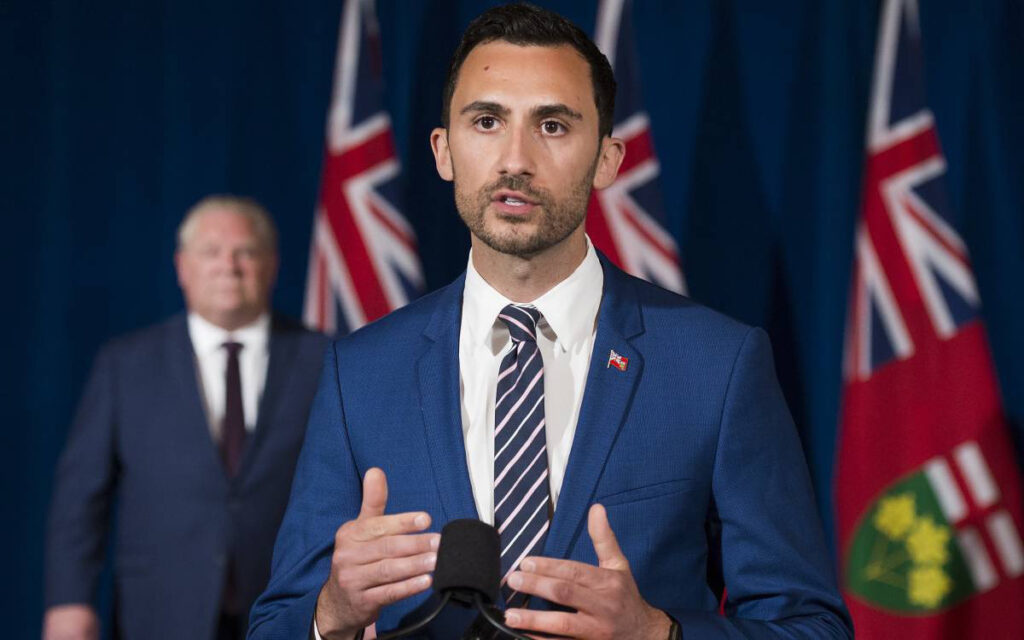
Dividing people as the school board’s manual does, wanting teachers to react to students according to their membership in a racial or other specially designated group is wrong and it is divisive, and it undermines the whole purpose and value of education. Pictured: Ontario Minister of Education Stephen Lecce and Premier Doug Ford. Photo Credit: Canadian Press/Nathan Danette.
Some days, Ontario Education Minister Stephen Lecce must think he is presiding over a bizarre social science project rather than a functioning education system.
It seems like every time he turns around, there is another outburst of the latest “woke” trend. It might be amusing if it wasn’t so serious.
The latest eruption is from the Toronto District School Board. An internal document entitled “Facilitating Critical Conversations – a Teaching Resource for Challenging Oppression in Toronto District School Board Classrooms” – was recently distributed to all its teachers.
Its purpose was to help guide classroom discussions on injustice. But instead of guidance, it offers a political rant, claiming that our public education system is based on “white supremacy” and is designed only for the benefit of those who are “white, middle-upper class, male, Christian, cisgender, heterosexual, able-bodied, neurotypical, etc.”
If that is the case, then the provincial government should start asking where the millions of dollars go that are invested each year to help students with various learning challenges, different physical or mental abilities or those from diverse or underprivileged communities.
The manual goes on to state that “education is a colonial structure that centres on whiteness and Eurocentricity and therefore it must be actively decolonized.”
What is worse, is that it advises that “race matters” because it is a “visible and dominant identifying factor in determining people’s social, political, economic and cultural experiences.” In other words, it doesn’t matter who you are, as an individual, or what you do or are capable of doing, you are to be judged and treated according to your race. Teachers are supposed to interact with students, based on their “identity group.”
This is the same kind of thinking that tainted the board’s attempt at a new math curriculum when it stated that math “has been used to normalize racism and marginalization of non- Eurocentric mathematical knowledges and a decolonial, anti-racist approach to mathematics educations makes visible its historical roots and social constructions.” One of the teacher’s pushing this agenda was quoted as saying that “2 + 2 = 4 was a covert example of white supremacy.”
This would be news to the many individuals from many different backgrounds and societies over our history, who have contributed to our modern-day understanding of mathematical principles.
One of the great foundations of modern, western democracies is that individuals do matter and should be treated as such, with respect for their rights and privileges as individuals, whatever their race or creed, not to be judged and pigeon-holed according to one’s race or religion or physical or mental differences.
Does that mean we get it right every time? Absolutely not. From the treatment of indigenous groups to fighting for the rights of the gay community, it has been a long, painful journey, one that still has a way to go.
But dividing people as the school board’s manual does, wanting teachers to react to students according to their membership in a racial or other specially designated group is wrong and it is divisive, and it undermines the whole purpose and value of education.
Ontario Education Minister Stephen Lecce wasted no time in telling the school board to scrap the document.
“Schools are a place for learning life and job skills, above all else,” Lecce said. “My message to school boards is clear: there is no place for divisive ideologies – every action they take should prioritize and support academic achievement.”
Or perhaps we should listen to another leader, regarded as a hero in the early civil rights battles in the United States, Dr. Martin Luther King Jr.
“I have a dream,” King said, “that my four little children will one day live in a nation where they will not be judged by the colour of their skin but by the content of their character.”
Many members of various diverse communities will point out that we are not there yet. But teaching our children to judge others by what label someone puts on them, is not going to get us there either.

Janet Ecker is a former Ontario Finance Minister, Minister of Education, Minister of Community and Social Services and Government House Leader in the governments of Premier Mike Harris and Premier Ernie Eves. After her political career, she served as the founding CEO of the Toronto Financial Services Alliance, a public-private partnership dedicated to building Toronto region into an international financial centre. She currently sits on a number of corporate and non-profit boards, agencies and advisory committees.
Ms. Ecker received the Order of Canada for her public service contributions and was recognized as one of the “Most Influential People in the World’s Financial Centres” by Financial Centres International. She also received a “Canada’s Most Powerful Women: Top 100 Award” from the Women’s Executive Network and the Richard Ivey School of Business, among other awards. She is also one of the founders of Equal Voice, a national, multi-partisan organization working to elect more women.






